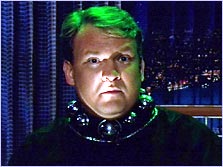 Over at Cnet, Charles Cooper has a nice post on a meaningful historical tidbit: Twenty years ago today, Tim Berners-Lee, who was working at the European Organization for Nuclear Research near Geneva, Switzerland, submitted a proposal to his bosses on how the organization could do a better job of keeping track of information. It involved publishing documents online with links to tie everything together, and it was the idea which eventually turned into the World Wide Web.
Over at Cnet, Charles Cooper has a nice post on a meaningful historical tidbit: Twenty years ago today, Tim Berners-Lee, who was working at the European Organization for Nuclear Research near Geneva, Switzerland, submitted a proposal to his bosses on how the organization could do a better job of keeping track of information. It involved publishing documents online with links to tie everything together, and it was the idea which eventually turned into the World Wide Web.
If you were trying to determine the twentieth anniversary of the Web, you probably wouldn’t decide it was today. (Another possibility would be August 6th, 2011–the day that marks two decades since Berners-Lee’s first Web site went live on the Internet.) But his 1989 memo remains good reading, and the fact that his plan to change how CERN used information turned out to change how the world uses information is as inspiring as stories about technology get.
I’m about to board an airplane to go to the South by Southwest Conference in Austin, and have been brooding about the fact that I’ll be deprived of the Web for just a few hours while we’re in flight. It’s startling to remember that something as essential as the Web is so new–and that the guy who came up with it is not only still with us but very much involved in shaping its future.
Thanks, Sir Tim! I feel like I owe you my career–because if there weren’t a Web, there sure wouldn’t be a Technologizer…

 It might not be
It might not be  Back on December 31st, I
Back on December 31st, I Us longtime Conan O’Brien fans know that one of the signature skits of his late night show was “In the Year 2000,” which made predictions — however ridiculous — of what life would be like in the future. Well, Pew Internet and American Life project did something similar, but they took a serious look at life in the year 2020.
Us longtime Conan O’Brien fans know that one of the signature skits of his late night show was “In the Year 2000,” which made predictions — however ridiculous — of what life would be like in the future. Well, Pew Internet and American Life project did something similar, but they took a serious look at life in the year 2020.